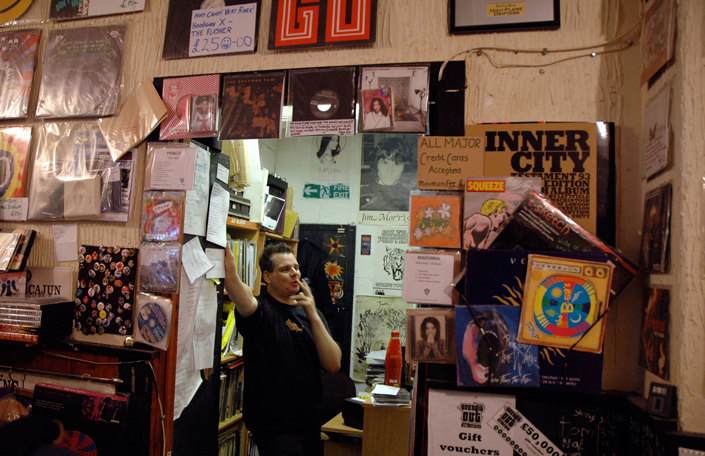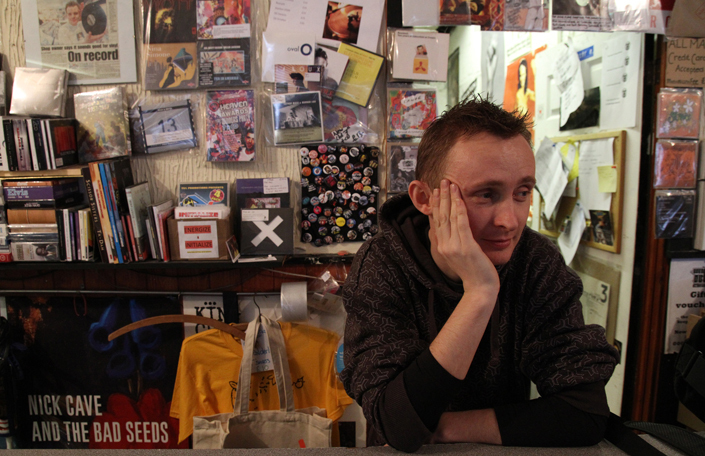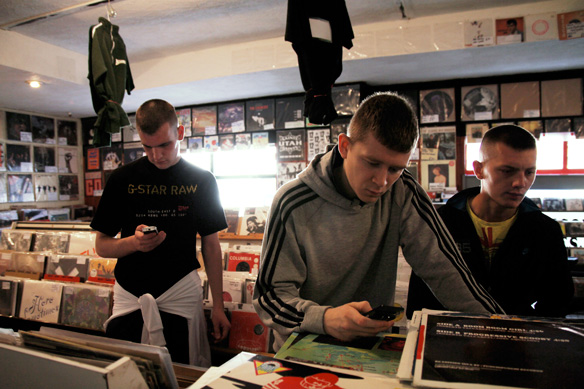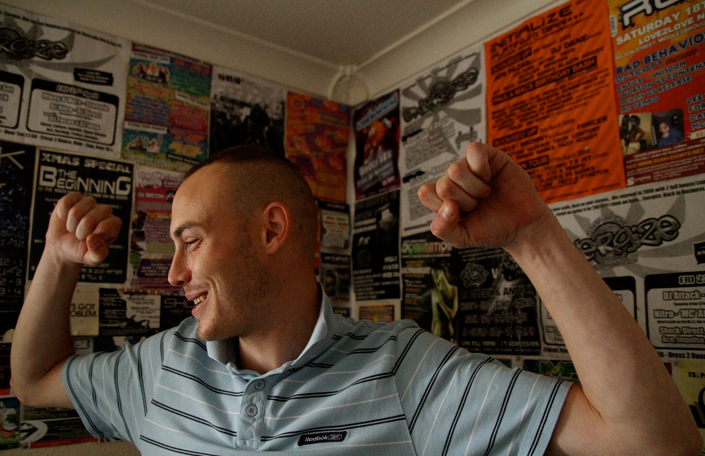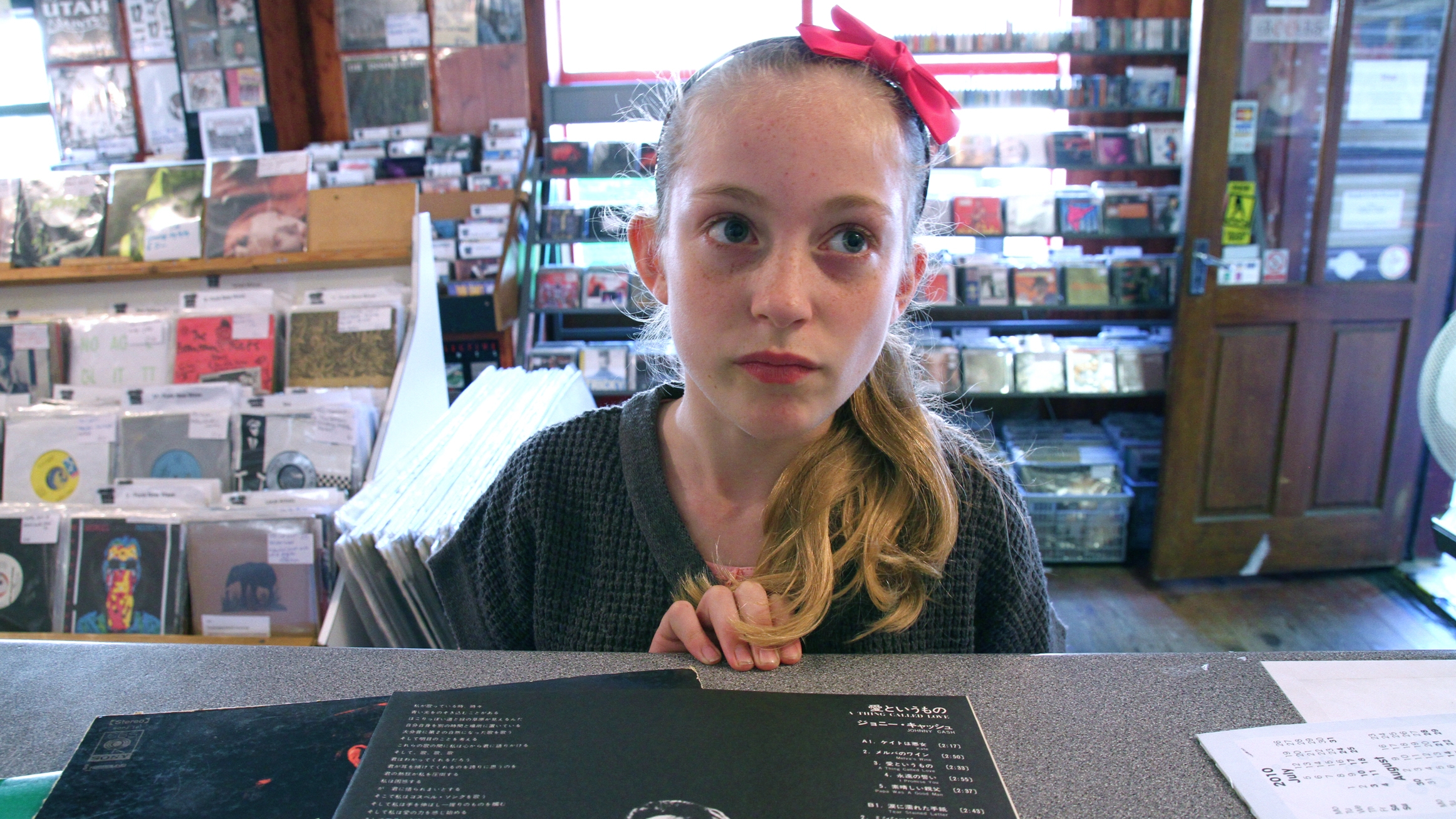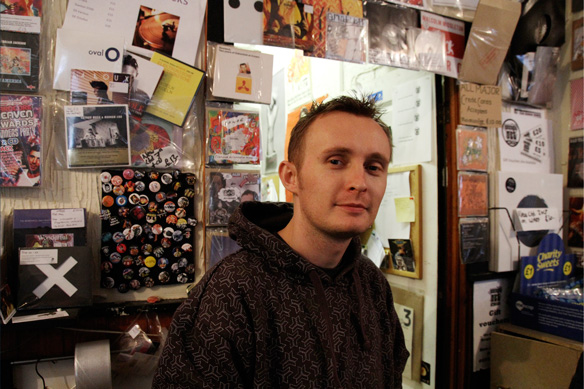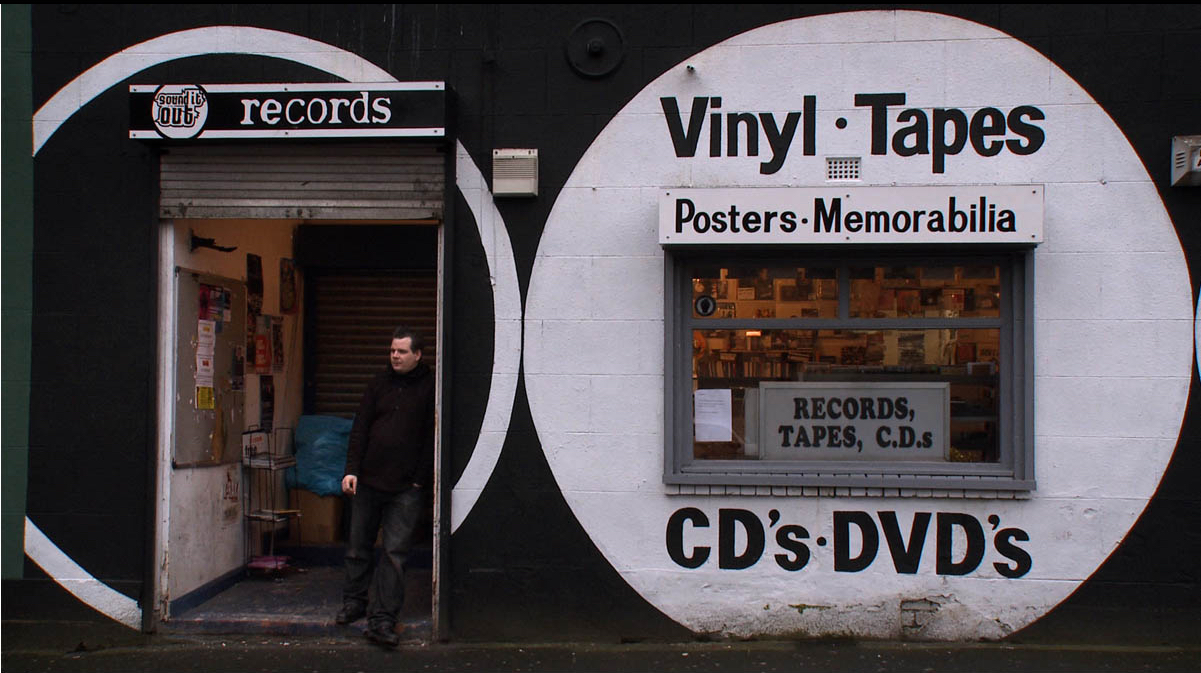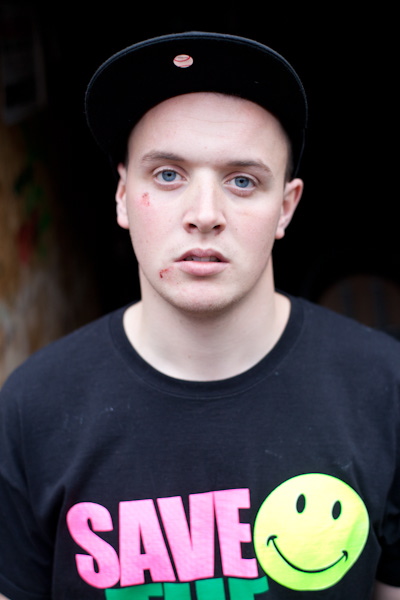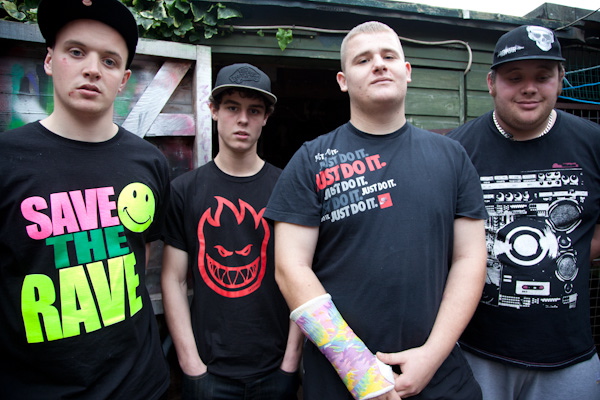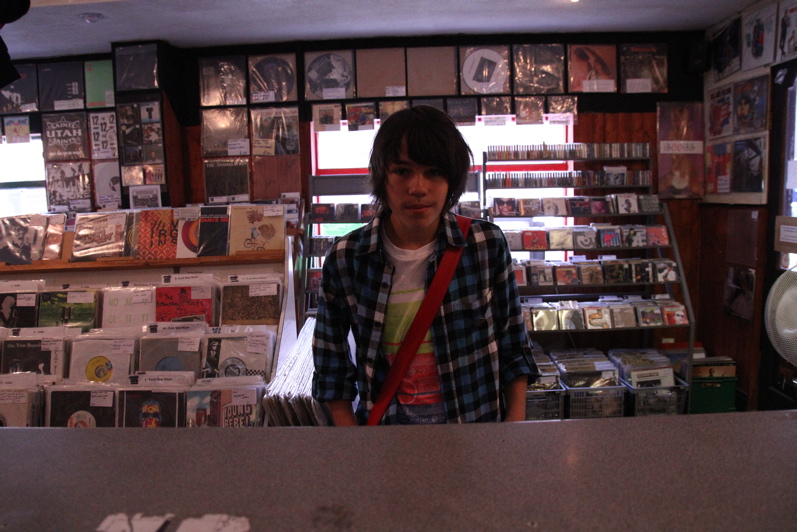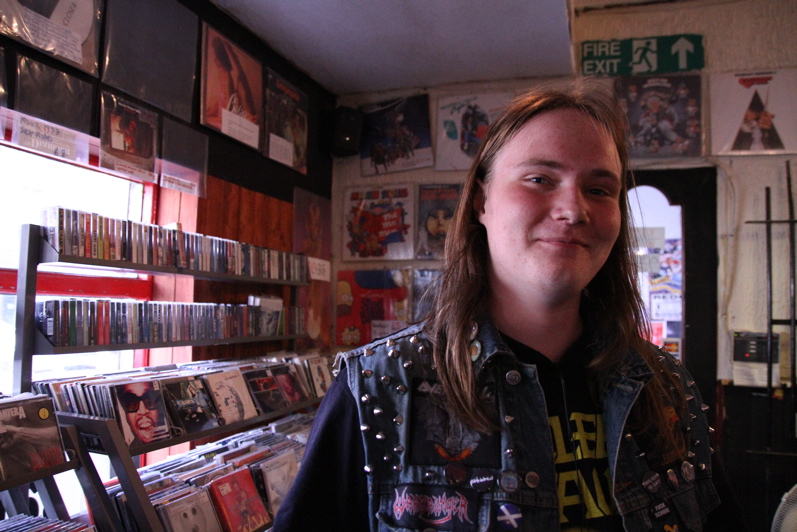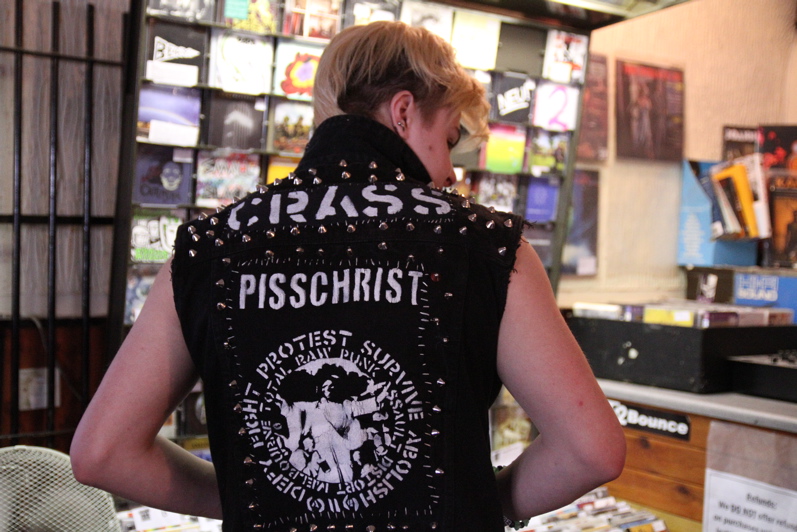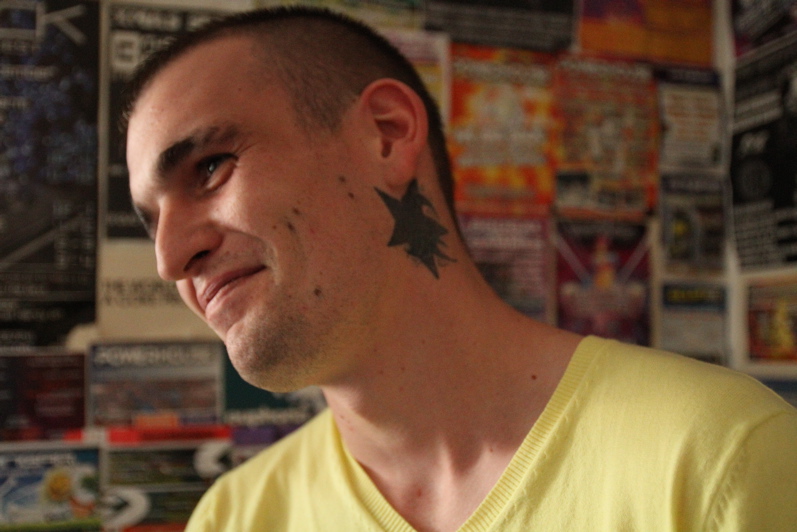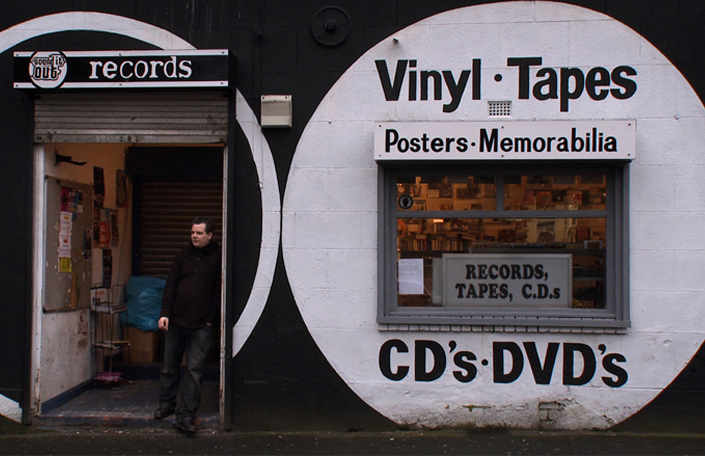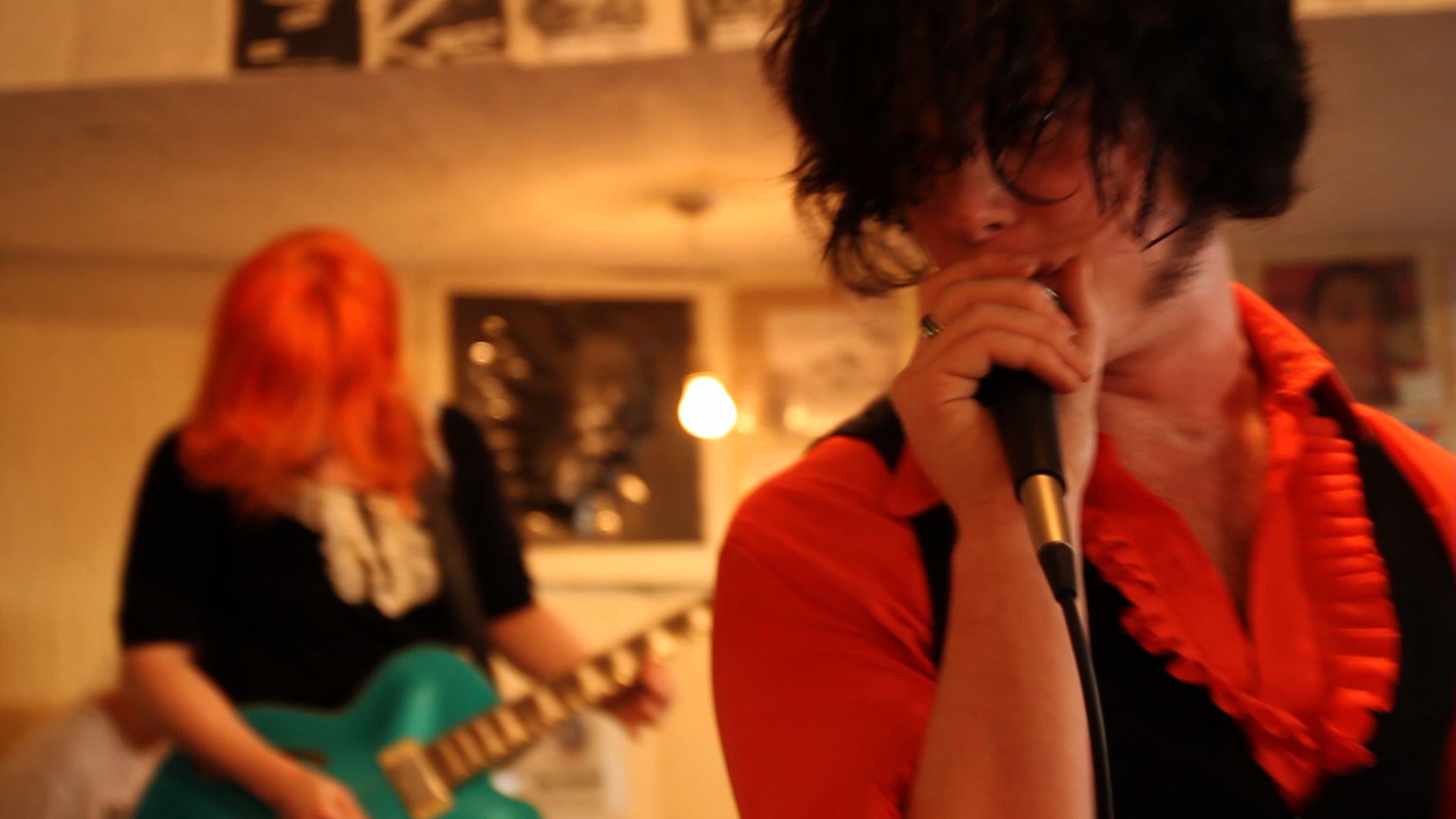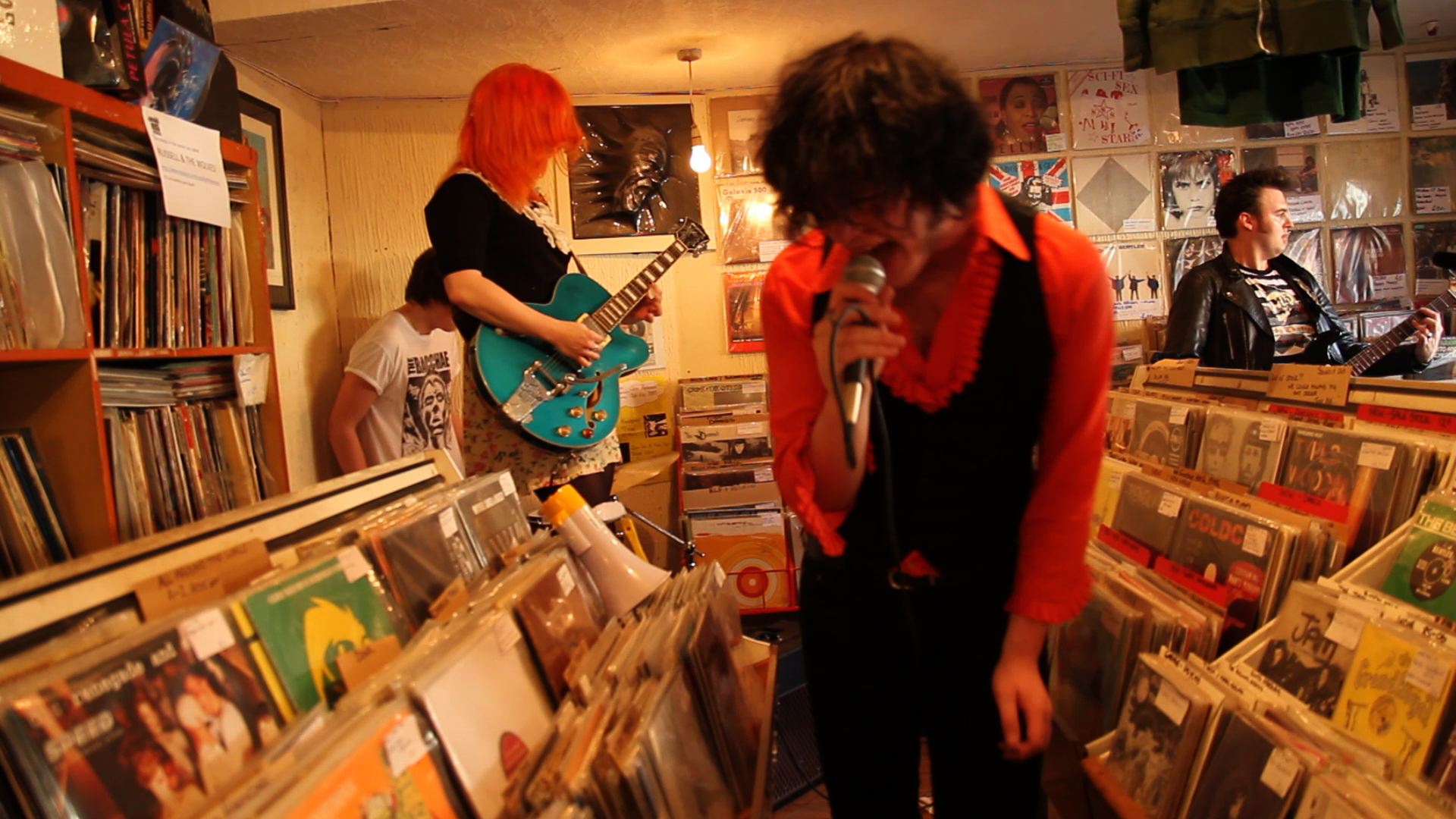“It’s all emotions and memories. Records hold memories”
Over the last five years an independent record shop has closed in the UK every three days. SOUND IT OUT (75 mins) is a documentary portrait of the very last surviving vinyl record shop in Teesside, North East England.
A cultural haven in one of the most deprived areas in the UK, SOUND IT OUT documents a place that is thriving against the odds and the local community that keeps it alive. Directed by Jeanie Finlay who grew up three miles from the shop.
A distinctive, funny and intimate film about men, the North and the irreplaceable role music plays in our lives.
REunion April 19th 2020 - hosted by Josie Long with Tom, Saint Saviour, Jeanie, Sam & gareth

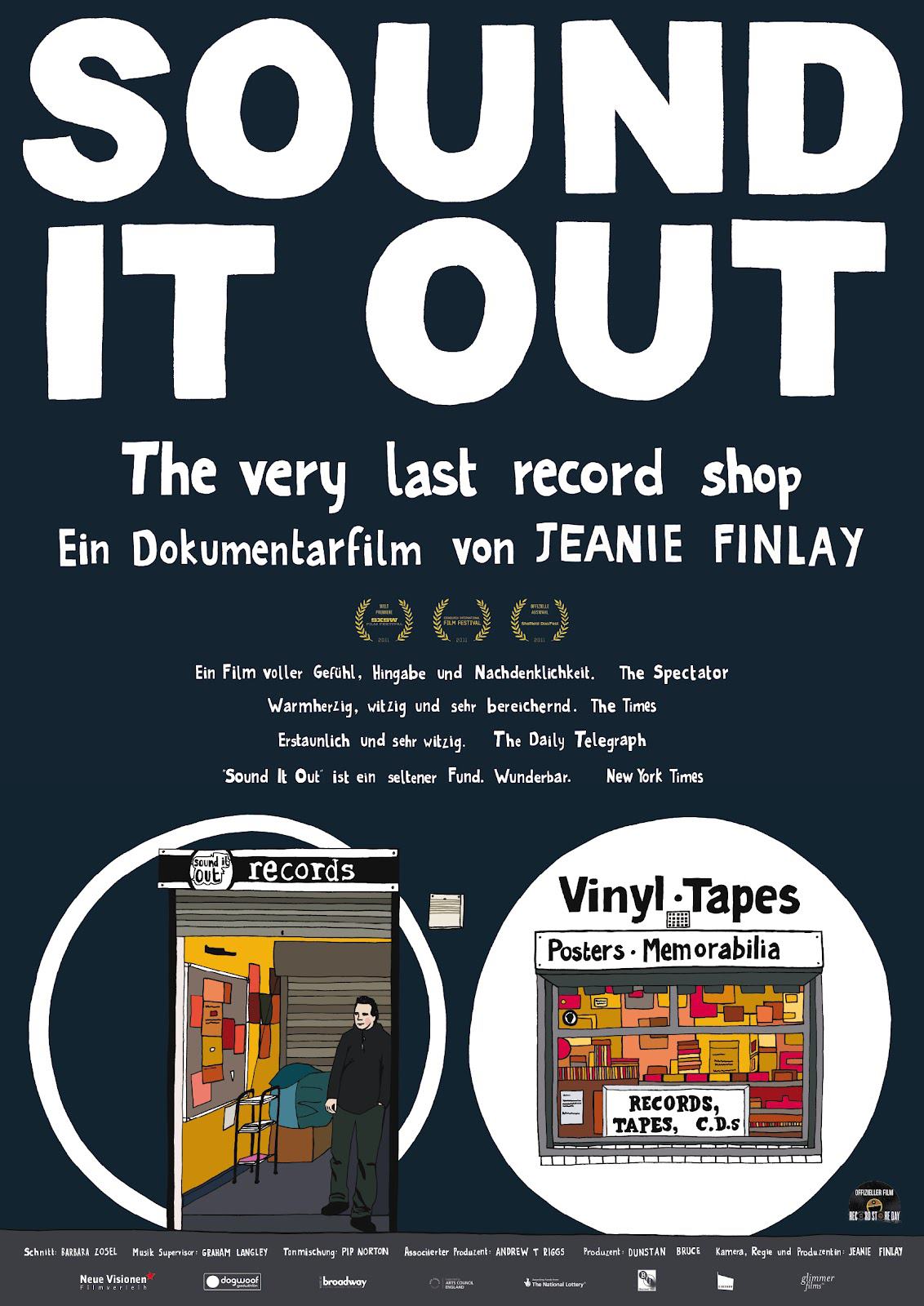
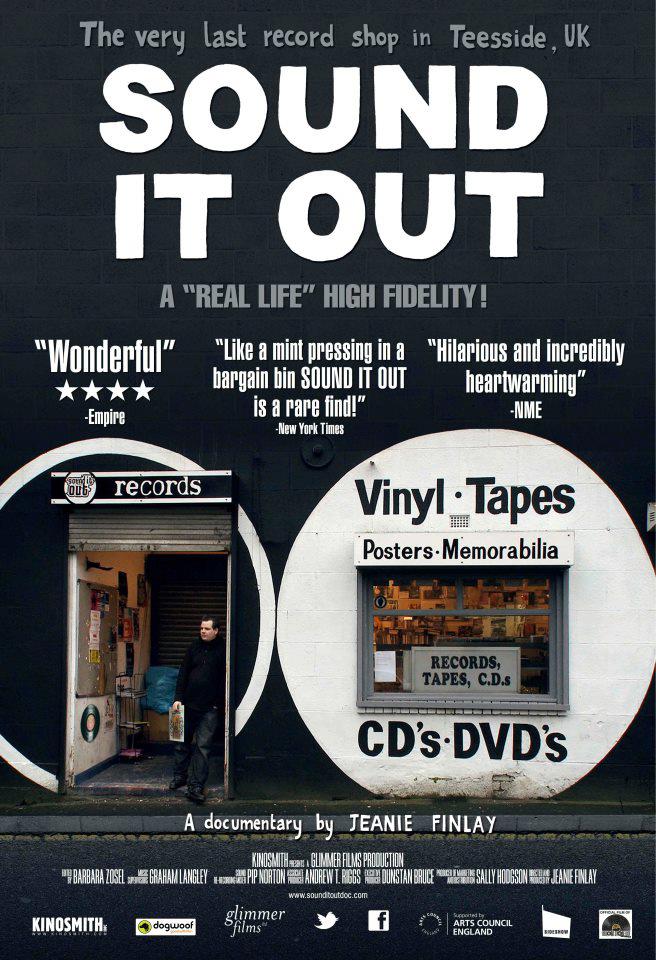
2011. 75 Mins. Documentary
A Glimmer Films Production in association with Sideshow.
Supported by Arts Council England and 456 member of the public through crowdfunding.
Tour supported by British Film Institute
Winner: Cinema Versa Award LEEDS INTERNATIONAL FILM FESTIVAL
“Like a mint pressing in a bargain bin, Sound it Out is a rare find” NEW YORK TIMES
”Hilarious and incredibly heartwarming” NME
★★★★ ”Wonderful” EMPIRE
★★★★ THE INDEPENDENT
★★★★ THE DAILY TELEGRAPH
★★★★ EVENING STANDARD
★★★★ SUNDAY TIMES
Website: www.sounditoutdoc.com
LISTEN
Music Cue Sheet
https://docs.google.com/document/d/16sKOEiXiwm5t8Fq6MdgFT7GHsyKhgJxutTNkTLx0bLI
Full Soundtrack List
SO FORLORN (..AGAIN) – King Creosote
SWAN SONG – Das Wanderlust
WITCHES BIRDIES – Detective Instinct
DREAM COLOURS – Defnoyz
WHEELS IN MOTION – JB Butterfield
NOW THEN - Idiot Savant
BABY STEPS – Idiot Savant
LOVE WILL TEAR US APART – Saint Saviour
MIDWINTER CAROL FOR YAMAHA ICEBLOCK – Das Wanderlust
PYRAMINTRO – Das Wanderlust
CAROLINE – Status Quo
EQUILIBRIUM – DJ Riproar
THE SOUND OF THE RADIO – The Chapman Family
Turbo Hyper Ultra Mega Power – Mutant
MOUNTAIN TOP – We Show Up on Radar
FIRES - Laboratory Noise
TESLA – Laboratory Noise
A CERTAIN DEGREE – The Chapman Family
THE ORANGE SHOP – Das Wanderlust
SILVER DOLLARS – Allo Darlin’
SUBTLE AS A BRICK – Das Wanderlust
READ
IT'S NICE THAT: “The shop felt like a microcosm of Teesside – the vinyl, a mirror for all the industry that had died in the area – analogue struggling on."
Jeanie Finlay speaks to Rob Alderson from It's Nice That. “It’s all about emotions with records. Emotions and memories.” So says Tom, the owner of the last record shop in the Teesside area of north-east England about this final bastion of all things vinyl, and the same sentence could apply to Jeanie Finlay’s documentary itself. Sound It Out is a film about music that’s not really about music at all, drawn out with wit, intimacy and care. To mark the film’s DVD release, we spoke to Jeanie about how it came about and why Teesside is like "an irritating family member”
It was the horror of the shop’s manager when Jeanie went into to flog boxes of much-loved records to help pay for her wedding that first suggested there was a story to tell here. But it was not until her mother fell ill and she started spending more time at home – and more time in the shop – that she appreciated the power of the emotional pull vinyl, and this shop in particular held over her.
“It felt like a haven going into the shop and when I looked around I realised it was a haven for everyone who was in there.
“I had just worked on a bigger budget film with two units and after that I wanted to do something on my own. I like making films about smaller stories because through them you can tell much bigger stories.
“The shop felt like a microcosm of Teesside – the vinyl became a pocket mirror for all the industry that had died in the area – analogue struggling on.
“Also I liked the idea of a woman making a film about men, northern men. I was in there for a month and never saw another woman in the shop.”
Like so many great tales, it works equally well on both the universal and the personal level. Record shops are dens of obsession, but music is so much more than the final plastic product.
“Music becomes the signposts in people’s lives and I am interested in the way you can map out love, childbirth, heartache by what people were listening to at the time. If you ask people about music what they like they tell you everything about themselves.”
This combination of music-addicts loving to talk about their passion, and the things they may reveal while doing so, makes for some incredibly enlightening interviews.
“It’s human nature to like talking about yourself but I am always amazed how open people are. You have to treat their stories with care – that is so important.”
But it was also a story wrapped up in Jeanie’s own past, and her own identity, which shines through in a discernible but not self-indulgent way.
“For me it was an opportunity to make a film about home. Teesside is an area I have got a love/hate relationship with – it’s like an irritating member of the family – you don’t want anyone else to criticise them but you are filled with love and loathing about them.”
Fantasticaly, despite it looking during filming like the battle to keep Sound It Out open was doomed, it has remained open and continued to flourish. Jeanie insists it would be “disingenuous” to suggest it was her film that saved it, but she does believe, “it helped articulate just how important it is to the area. It hit home.”
The film was partly crowd-funded through the IndieGoGo website, the first time Jeanie has worked in this way but an experience she is hugely positive, if realistic about.
“It was the best fun, the best experience but you have to do a whole marketing campaign yourselves. Overall though 457 people put their hands in their pockets which was amazing. It was massively liberating – I did not have to sit through endless meetings with broadcasters talking about the story arc.
“It was like being an indie record label – fraught with the stress of not having much money but the connection with the audience is so much more direct.”
An apt metaphor for this uplifting loveletter to vinyl, and to a small shop, in a small town which continues to flourish.
THE TIMES: “Meet the stars of a very small kingdom”
A film-maker from the North-East has made a warm, funny and insightful portrait of her home town – and its last record shop.
Record shops up and down the country are facing closure. Three hundred have shut in the UK over the past decade, partly because of a loophole that has allowed online music companies to avoid VAT by shipping from the Channel Islands, thereby offering prices that record shops couldn’t hope to match. One quietly inspiring film-maker from the North East, however, may have helped to turn the tide.
Jeanie Finlay wanted to make a film about her home town of Stockton-on-Tees, a place she describes as “like Middlesbrough, only less glamorous”. Hearing that an old school friend called Tom Butchart was running the last surviving record shop in Teesside, she began filming.
Sound It Out is a warm, funny, insightful portrait of the community based around the shop — also called Sound It Out — that has been a hit in America, after its premiere at the SXSW Festival and a review in The New York Times that raved: “Like a mint pressing in a bargain bin this film is a rare find.” It also helped Butchart to win Stockton’s Small Business of the Year award, and it has shown how important record shops can be.
“It’s an accidental film,” Finlay says. “Stockton is like the annoying member of your family that you don’t want anyone else to slag off: the high street may be nothing but charity shops and pound shops, but I’ve still got a lot of affection for the place. When I heard that Tom, who I remembered as a shy boy with a stutter, had opened this record shop where he was the king of a very small kingdom, I decided to go up there and start filming.”
Finlay soon realised that she wasn’t making a film about the plight of a small record shop, but portraits of the people for whom Sound It Out is a haven. Mack, who comes in from the pub and sings the record he wants until Butchart identifies it; and a pair of teenage metalheads who explain how if it wasn’t for buying records they would have killed themselves long ago.
Finlay’s film is as non-judgmental as it is revealing, with people on the margins of society celebrated for their eccentricities.
“The interesting people soon revealed themselves,”
There are Frankey and John-Boy, an unemployed DJ and MC duo, who make a tinny style of dance music called makina. They look like shaven-headed tracksuit-wearing delinquents who you would cross the street to avoid. “When I was a kid I did judo near to their estate, and I was scared of boys like them,” Finlay says. “Then you find out they’re sweet lads who are nice to their mums.” As Butchart says: “The shop is somewhere for people to go and escape their lives for an hour. That’s important.” Or, in Mack’s words: “You can get anything you want in there … except loose women from Taiwan.”
Finlay specialises in turning her camera on marginal figures. One of her most popular documentaries is Goth Cruise, which follows 150 black-clad self-proclaimed outsider types on a luxury liner cruise from New Jersey to Bermuda. “I went to a Goth wedding a few years ago,” Finlay says. “They were talking about this cruise and I thought: can you be a Goth in the tropical heat, on a floating shopping centre?”
Absolutely. Armed with total sunblock and black bikinis, the Goths frolic on beaches and make the most of the duty-free shopping. Then there is Home-Maker, Finlay’s debut, which follows the lives of housebound people in Derbyshire and Tokyo. “It started off as a community project. I was meant to show elderly people how to use computers,” she says. “But they had absolutely no interest in learning; they just wanted to chat.”
If you’re wondering how Finlay funds her ventures, she doesn’t. Sound It Out had no backing; the editing, distribution and marketing was paid for through crowd funding, which works in much the same way as a sponsored swim.
“I’m friends with a lot of American film-makers who have no funding; they just get on with it,” she says. “You don’t know what you are making until you make it, so although I’m broke, you end up with something interesting.”
Finlay has two projects in development. The Great Hip Hop Hoax is about a pair of Scottish singers who pretended to be American rappers to land a record deal with Sony, and Orion is about the rise and fall of Jimmy “Orion” Ellis, a masked American singer briefly marketed as Elvis Presley returned from the grave. When Ellis took his mask off his career collapsed.
Sound It Out is emerging as George Osborne closes the VAT loophole that has hit record shops so hard. “Music sales have declined gradually, but CD sales migrated to offshore internet retailers at a rapid rate due to the VAT advantage,” says Richard Allen, an independent retailer who lobbied the Government to change the law. “Normally politicians and the music industry don’t mix very well, but in this case George Osborne has made a decision that could save record shops.”
Shops such as Sound It Out may occupy a small place in British culture, but that’s what makes Finlay’s film special. “Sound It Out is about a small shop, in a small street, in a small town,” she concludes. “I’m interested in making small films. That way I get to turn the camera on people that I would never normally meet, but who turn out to be very interesting indeed.”
BUY
tour
MORE THAN MUSIC
MORE THAN MUSIC was a worldwide memory bank of the record stores that changed our lives. Built in response to hundred of audience email, it was a place to express the sentiment at the heart of the film SOUND IT OUT that “records hold memories” and it’s about so much ‘more than music’. Audiences were asked to: “Tell us about the music you bought there, the sounds you fell in love and the memorable characters you met.”
Built by Gareth Howell
STILLS
